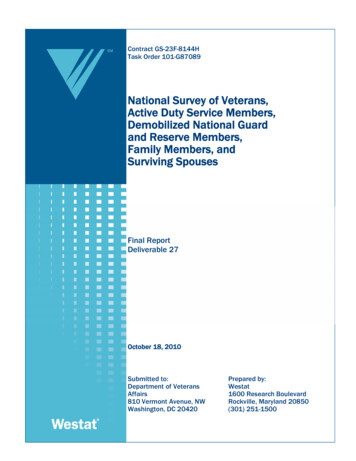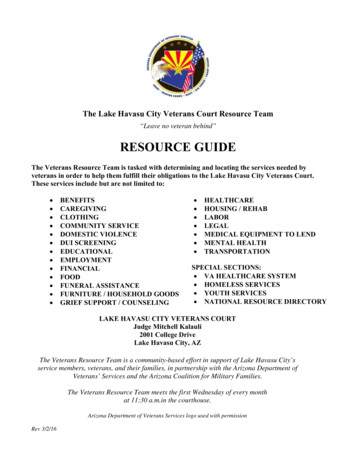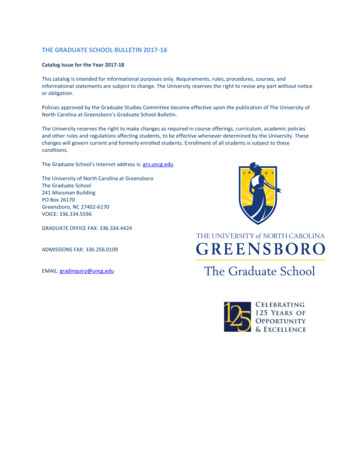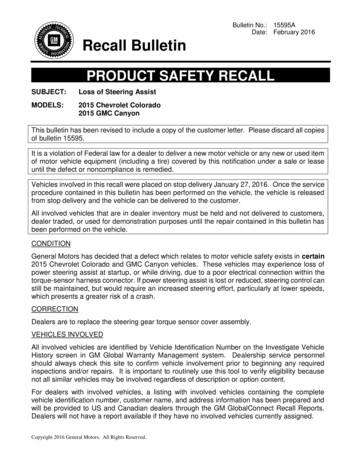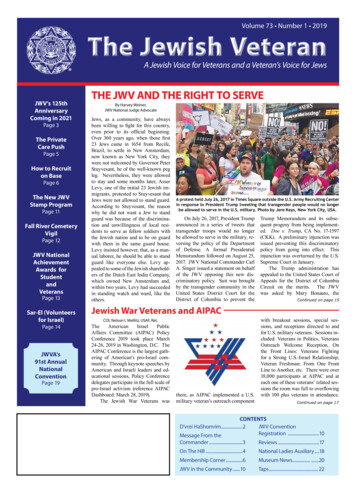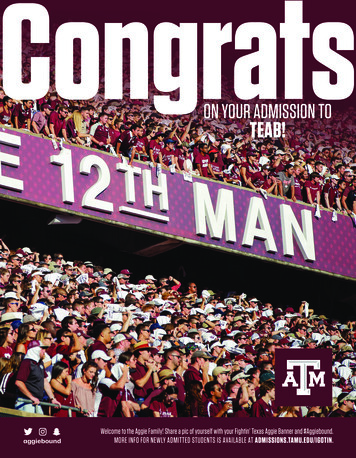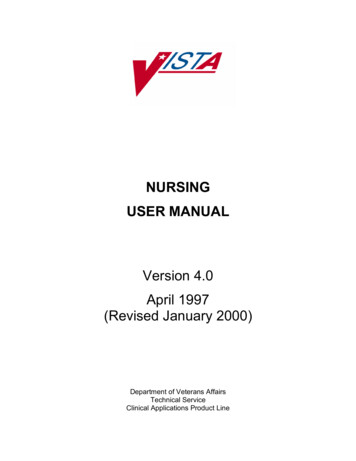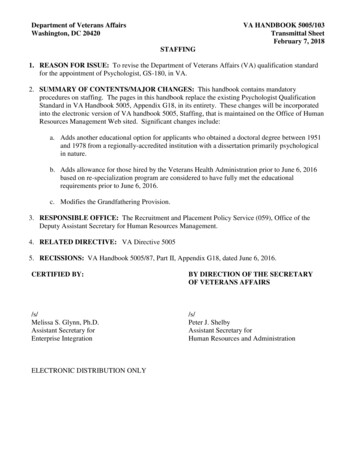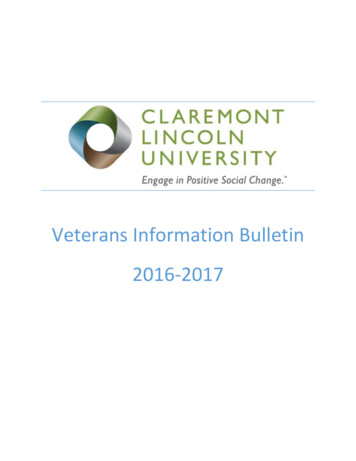
Transcription
Veterans Information Bulletin2016-2017
Name of Institution:Claremont Lincoln UniversityAddress:250 W. 1st Street, Suite 330Claremont, CA. 91711Telephone Number:Main Number(909) 667-4400Fax Number(909) 399-3443Admissions Office (909) 667-4485Financial Aid(909) 667-4484Student Services (909) 667-4400Military & Veterans Service RepresentativeDeb Barker-GarciaPhone: (909) 667-4484Email: dbarker-garcia@claremontlincoln.edu1
Claremont Lincoln University .3College Governing Body, Administrators, Advisory Boards.4Administrative Campus.4Academic Calendar . .5Tuition & Fees/Cost of Attendance .7Educational ProgramsM.A. Ethical Leadership 8M.A. Interfaith Action 9M.A. Social Impact .10PoliciesAdmission Requirements . .11Credit for Prior Education and Training . .12Participation Policy . .12Military Students Called to Active Duty/Readmission of Service Members.12Satisfactory Academic Progress .12Suspension & Reinstatement of Veterans Benefits .12Student Conduct Policy 13Tuition Refund Policy 142
HISTORY OF THE UNIVERSITYClaremont Lincoln University traces its inception to March 2008 when the Board of Trustees atClaremont School of Theology voted to embark on an ambitious plan to incubate a new interreligiousgraduate school. The innovative institution would invite leaders, scholars and practitioners of theworld’s great religious traditions to engage in dialogic education to decrease suspicion and fostercollaboration in order to more effectively work toward positive social change. After over two years ofplanning, Claremont Lincoln University launched on May 16, 2011 with classes beginning the followingfall.In June 2013—only two years after its founding—Claremont Lincoln received Candidacy status from itsregional accrediting body (WASC), which set it on a pathway to independence from its parent institution.In early 2014, Claremont Lincoln requested from WASC and was granted an independent accreditationprocess to continue its path toward initial accreditation. As part of this process, Claremont Lincolnassumed governance of its own educational programs and began charting a new path forward as afree-standing institution. In February,2016 Claremont Lincoln University was granted accreditation byWASC Senior College and University Commission.Today, Claremont Lincoln is expanding on its original vision to assemble diverse leaders, scholars andpractitioners from across the social sectors to collaborate on our most persistent problems. The originalinterreligious focus is thriving at the University, through the newly designed M.A. in Interfaith Action.Another new degree, the M.A. in Social Impact, is designed to attract emerging leaders from the socialsector who want to conceive, design and implement more effective initiatives for social change. Thepreexisting M.A. in Ethical Leadership, designed by faculty from the original consortium, continues toeducate experienced professionals in a variety of sectors to be more ethical, effective leaders in theirorganizations. Students from each of these programs take a sequence of core classes together in orderto learn about and from those working in other professional and social sectors. As a result, ClaremontLincoln graduates will be more knowledgeable about and able to work more effectively with leadersacross the social sectors – non-profit, corporate, religious, civil – toward shared understandings forpositive social change.Claremont Lincoln’s mission is to educate learners in new ways of understanding. It is a new kind ofuniversity that brings people of diverse cultural, religious and ideological backgrounds together so thatall can flourish in this interconnected age. This is the transformative vision for Claremont LincolnUniversity, which we offer as a spark of optimism for the times in which we live: to be a postmodern,post-secular educational institution that seeks common threads amidst human diversity to betterunderstand and more effectively address our perennial social problems. This is what we mean by“putting wisdom to work.”3
University Governing Body, Officials & FacultyA complete list of Claremont Lincoln University Governing Body, Officials & Faculty may be foundstarting on page 58 of the University Catalog.Administrative CampusThe Administrative Campus of Claremont Lincoln University is located 35 miles east of Los Angeles, inClaremont, California. The city of Claremont is situated at the eastern edge of Los Angeles County nearthe geographic region known as the Inland Empire (comprised of Riverside and San BernardinoCounties), a growing region characterized by an increasingly ethnically, economically, and religiouslydiverse population. Known as “the city of Trees and Ph.Ds.,” the city is home to the Claremont Colleges,an educational consortium that consists of two graduate and five undergraduate schools. This uniqueeducational consortium attracts scholars, practitioners, and artists from around the world; about 5,200students and 500 faculty members inhabit this town of 35,000 people.4
ACADEMIC CALENDARJuly Term 2016:Independence Day (Offices Closed) July 4Last Day to Receive 100% Refund for Dropped ClassesClasses BeginLast Day to Add a Class1/3 Tuition due for July TermLast Day to Receive 75% RefundLast Day to Receive 25% RefundLast Day to Drop a ClassLast Day to Withdraw from a Class and Receive a W GradeLabor Day (Offices Closed)Final Tuition Payments due for July TermClasses EndAll work from April Term Incompletes DueRegistration Opens for OctoberFinal Grades PostedJuly 8July 11July 11July 11July 15July 22July 22August 26September 5September 16September 18September 18September 19September 23October Term 2016:Gathering Weekend and Orientation September 30 –Last Day to Receive 100% Refund for Dropped ClassesClasses BeginLast Day to Add a Class1/3 Tuition due for October TermLast Day to Receive 75% RefundLast Day to Receive 25% RefundLast Day to Drop a ClassVeteran's Day (Offices Closed)Thanksgiving (Offices Closed)Last Day to Withdraw from a Class and Receive a W GradeFinal Tuition Payments due for October TermClasses EndAll work from July Term Incompletes DueRegistration Opens for JanuaryChristmas Day Observed (Offices Closed)Final Grades PostedOctober 1October 7October 10October 10October 10October 14October 21October 21November 11November 24November 25December 16December 18December 18December 19December 26December 23January Term 2017:New Year's Day Observed (Offices Closed)Last Day to Receive 100% Refund for Dropped ClassesClasses BeginLast Day to Add a Class1/3 Tuition due for January TermLast Day to Receive 75% RefundMartin Luther King Day (Offices Closed)Last Day to Receive 25% RefundLast Day to Drop a ClassJanuary 2January 6January 9January 9January 9January 13January 16January 20January 205
ACADEMIC CALENDAR CONT’D.President's Day (Offices Closed)Last Day to Withdraw from a Class and Receive a W GradeFinal Tuition Payments due for January TermClasses EndAll work from October Term Incompletes DueRegistration Opens for AprilFinal Grades PostedFebruary 20February 24March 17March 19March 19March 20March 24April Term 2017:Gathering Weekend, Orientation and CommencementCommencementLast Day to Receive 100% Refund for Dropped ClassesClasses BeginLast Day to Add a Class1/3 Tuition due for April TermLast Day to Receive 75% RefundLast Day to Receive 25% RefundLast Day to Drop a ClassLast Day to Withdraw from a Class and Receive a W GradeFinal Tuition Payments due for April TermClasses EndAll work from January Term Incompletes DueRegistration Opens for JulyFinal Grades PostedMarch 31 – April 2April 2April 7April 10April 10April 10April 14April 21April 21May 26June 16June 18June 18June 19June 236
TUITION AND FEES 2015-2016TuitionMaster of Arts (M.A.) 500 per unitApplication and Admission FeesApplication for Admission 50Confirmation Deposit 200Student BudgetThe 2016/2017 Cost of Attendance is used to calculate financial aid eligibility. Claremont Lincoln University utilizesannual cost of attendance figures provided by the College Board in conjunction with its own tuition costs. The COAfor CLU students utilizes an average cost of tuition, books & supplies, transportation and living expenses.2016/2017 Cost of Attendance (FT Student) Tuition 12,000 Books & Supplies 650 Housing 6,296 Transportation 1,982 Personal & Misc. 3,381 Loan Fees 220 TOTAL 24,5297
EDUCATIONAL PROGRAMSOnline ExpectationsThe Master of Arts programs at CLU is online in modality which requires students to meet certaintechnology requirements before beginning the program. Every learning environment expects certain 23aptitudes, whether these include managing deadlines, using research resources, or negotiatingtransportation. Online learning expects students are comfortable with computer technology. You do nothave to be a computer programmer to succeed in online learning, but you do need to know the standardconventions associated with modern computer use. Students taking courses online are responsible forproviding their own equipment for accessing course materials. This equipment includes a computerfewer than two years old; a high-speed Internet connection; a working email address; a word-processingprogram able to produce and open .doc, .docx, and .pdf files; and a sound card with speakers (forcourses requiring sound). Students may check the latest requirements posted within the learningmanagement system and on the syllabus of each course.M.A. IN ETHICAL LEADERSHIPThe M.A. in Ethical Leadership teaches working professionals about leadership, ethics, and ethical leadership whiletransforming them into ethical leaders in a diverse, globalized world. You will be led through a unique series ofonline courses that integrates personal mindfulness, professional awareness, and global consciousness for skillfulleadership in any organizational context.The program begins with a professional assessment and introduces you to leading-edge practices for selfawareness and mindfulness. You then learn about leadership and decision-making from various ethical, economic,philosophical, cultural, religious, humanistic, and contemporary traditions. By the end of the program, you willdevelop concrete skills—such as collaboration, conflict resolution, communication, and managing in diversesettings—for putting this newfound wisdom to work in your professional context. As a graduate of this program,you will have the knowledge and skills to lead more effectively and influence your workplace in a diverse andchanging world.Learning OutcomesAfter completing the Master of Arts in Interfaith Action you will be able to: Apply awareness of self and the multi-faceted perspectives of others locally and globally. Articulate the major theories in ethics, conduct analysis, and recommend ethical action. Articulate the major theories and principles of leadership, conduct analysis, and recommend behavioralchange strategies.8
Assess the cause of conflict in organizational settings and apply strategies to manage conflict in diverseenvironments. Research, design, develop, and implement a project plan to affect change in an organization. Demonstrate the interpersonal and engagement skills necessary for effective leaders in a globalcommunity or organization.A complete description of the program, along with course descriptions may be found on pg. 32 in the studentcatalog.M.A. IN INTERFAITH ACTIONIn an era characterized by religious pluralism and ideological polarization, the M.A. in Interfaith Action is intendedfor leaders in faith-based organizations, religious communities, and other public arenas in which religiousmultiplicity can simultaneously be a source of conflict and a rich resource for positive change. The degree willequip such leaders for deeper understanding and more effective engagement for individual transformation,effective organizational leadership and positive social change.Learning Outcomes:After completing the Master of Arts in Interfaith Action you will be able to: Interpret religion in relation to structures of power and privilege and in the context of cultural, political,and economic histories. Construct and demonstrate an evolving literacy of major religious traditions and cultural identities. Appraise the function of religio-cultural identities and apply strategies to resolve moral-based conflicts ina way that is non-defensive, confident, and respectful. Research, collaborate, design, and implement high-impact strategies in a leadership action plan for socialchange Analyze and interrogate normative and popular categories of religion while developing a post-secularawareness to interpret the evolving role of religious and secular traditions in the public sphere. Demonstrate the interpersonal and engagement skills necessary for effective leaders in a globalcommunity or organization.9
A complete description of the program, along with course descriptions may be found on pg. 35 in the studentcatalog.M.A. IN SOCIAL IMPACTThe M.A. in Social Impact teaches the capacities needed for mindful leaders—particularly, though not exclusivelyin the social and civic sectors—to envision, implement, and adapt efforts that generate positive and sustainableimpact within and/or beyond their organizations and communities. It is intended for those emerging leaderswith entrepreneurial spirits seeking the skills and perspectives to be intrapreneurs in their organizations andchange-agents in their communities, or catalysts for new social endeavors.Learning Outcomes:After completing the Master of Arts in Social Impact you will be able to: Function as mindful humanistic change agents and empathetic leaders skilled and knowledgeable about how tocatalyze and sustain changes in social systems. Synthesize the history, heritage, and context of social change and innovation for application to current worldproblems. Apply resourcing strategies built on current market principles and procedures. Research, analyze, and determine appropriate methods and contemporary strategies for designing and implementinginitiatives that generate positive social impact. Implement evaluation and learning approaches to gain visibility on and adapt efforts for systems change and socialinnovation. Demonstrate the interpersonal and engagement skills necessary for effective leaders in a global community ororganization.A complete description of the program, along with course descriptions may be found on pg. 38 in the studentcatalog.10
POLICIESADMISSION REQUIREMENTSCommitment to InclusionClaremont Lincoln University admits qualified students of any race, color, national or ethnic origin, sex, age,disability, religious tradition, sexual orientation, and gender identity to all the rights, privileges, programs, andactivities generally accorded or made available to students at the University. Admission is dependent upon thestrength of the applicant’s academic record, personal qualifications, professional goals, experience, anda demonstrated commitment to learning in a diverse community. Additionally, Claremont Lincoln welcomesapplications from non-immigrant aliens and students outside the U.S. Consistent with its obligations under the law,Claremont Lincoln University prohibits unlawful discrimination on the basis of race, color, national or ethnic origin,sex, age, disability, religion, sexual orientation, gender identity or expression, or any other characteristic protectedby applicable law in the administration of the University's programs and activities. Claremont Lincoln Universityalso prohibits unlawful harassment of any kind.Eligibility CriteriaTo be considered for admission to the Master of Arts (M.A.) programs, prospective students must demonstrate thefollowing requirements.1) Bachelor’s degree: Completion of a bachelor’s degree from a regionally accredited institution. Graduates offoreign universities must submit an official course-by-course international transcript evaluation from one of theapproved credential evaluation service agencies to the Office of Admission.2) Cumulative Grade Point Average: A minimum undergraduate grade point average of 3.00 on a 4.00 scale ispreferred.3) English Proficiency: : Graduates of foreign universities at which English is not the primary language must submitvalid, official, internet based (iBT) Test of English as a Foreign Language (TOEFL) scores. Computer basedtest (CBT) scores will only be accepted if applicant lives in a country that does not offer the iBT. Requests for aTOEFL waiver are considered on an individual basis.Please see Pg. 16 of the University Catalog for additional information on admission procedures.11
CREDIT FOR PRIOR EDUCATION & TRAININGCredit for prior education or training must be evaluated and reported to the U.S. Department of Veterans Affairs.Claremont Lincoln University evaluates credit for both military service and military coursework for academic creditusing ACE guidelines. All VA beneficiaries are required to disclose prior postsecondary school attendance, militaryeducation and training, and provide official transcripts. After reviewing all submitted transcripts, Claremont LincolnUniversity will grant credit where appropriate, notify the student and shorten the program accordingly. Thestudent is responsible for ensuring all transcripts are submitted to the University.PARTICIPATION POLICYStudent participation will be assessed primarily through student interactions within the learning managementsystem, usually in the form of discussion forums. Students who miss more than two weeks of activity during theterm will miss the significant learning opportunities and will very likely result in a failing gradeACADEMIC CREDIT AND MINIMUM GRADE REQUIREMENTSCourses in the Master of Arts can only be taken for academic credit. Students may not register for these courses asan auditor or for Continuing Education Units. All courses in the program are required for graduation, and must betaken for a letter grade. In the M.A. program, grades lower than a C (2.0) will not count toward the degree and thisclass will need to be repeated. Students may not earn credit more than once for the same class, and a course canbe repeated one time.ACADEMIC PROBATIONStudents will be placed on academic probation if their cumulative grade point average drops below 3.0 in the M.A.programs.In order to be removed from academic probation, students must develop a plan approved with the Dean to returnto good academic standing and obtain a cumulative grade point average of at least 3.0 in the M.A. programs uponcompletion of the next enrolled term. A student who remains on academic probation for two consecutive termsmay face dismissal. The Dean makes dismissal decisions.Students on Academic Probation will be notified by the University and will need to obtain approval from the Deanin order to register for the subsequent term.MILITARY STUDENTS CALLED TO ACTIVE DUTY-READMISSION OF SERVICEMEMBERSActive Duty Military students who left the University in order to perform military services will be readmitted withthe same academic status that he/she had when last in attendance at Claremont Lincoln University. The length ofabsence from Claremont Lincoln University cannot exceed 5 years. The university may require students to adopt12
the catalog year program requirements at the time of their return if a program has changed significantly or hasbeen impacted by external regulatory agencies.SATISFACTORY ACADEMIC PROGRESSStudents receiving VA benefits, you must maintain satisfactory academic progress in their program of study.Students receiving VA benefits are held to the same criteria for maintaining satisfactory academic progress as allother students attending Claremont Lincoln University.The Satisfactory Academic Progress policy may be found in its entirety in the University Catalog Addendum starting onpage 4.SUSPENSION & REINSTATEMENT OF VETERANS BENEFITSIf a student who fails to meet satisfactory academic progress, they will no longer be eligible to receive furtherVeterans benefits and/or financial aid without submitting an SAP appeal to the Financial Aid Office. This appealmust detail why the student was unable to meet minimum satisfactory academic progress requirements and thesteps being taken to meet the minimum requirements and regain eligibility. If the appeal is approved the student isplaced on SAP Probation for one term. Students who cannot meet the minimum requirements within one termmust meet with their Program Director to prepare an academic contract which outlines the terms and period thatwill allow the student to meet the minimum requirements.Any student who is still failing to meet either the qualitative or quantitative standards for maintaining satisfactoryacademic progress after completing their SAP Probation term will be disqualified from receiving further Veteransbenefits and/or financial aid. In addition, students are granted only one warning period while enrolled. Once astudent has used his/her SAP Warning Period and subsequently re-establishes eligibility, will automatically bedisqualified if student ever falls below the required minimums again.A student who is not making SAP regains eligibility only when the student is in compliance with the University’sSAP requirements. Therefore, if a student loses eligibility for Veteran’s benefits and/or federal financial aid as aresult of not meeting SAP requirements, the student must pay for the ineligible payment period using non-federalfinancial aid funds. If, after the ineligible payment period, the student meets all SAP criteria, the student’s Veteransbenefits and/or financial aid eligibility will be re-establishedSTUDENT CONDUCT POLICYViolation of standards of academic responsibility, integrity and truthfulness are subject to separate disciplinarypolicies.Claremont Lincoln University places high value on, and is diligently committed to, the preservation of academicfreedom. The basic significance of this commitment lies in the protection of intellectual freedoms: the rights ofprofessors to teach, of scholars to engage in the advancement of knowledge, and of students to learn and toexpress their views, free from external pressure or interference. These freedoms can flourish only in anatmosphere of mutual trust, honesty, civility, and respect among teachers and students, and only when membersof the community are willing to accept self-restraint and reciprocity as the condition upon which they share in its13
intellectual autonomy. Academic freedom extends to all who share these aims and responsibilities. They cannot beviolated by any who would subordinate intellectual freedom to any cause or ideology, or those who violate thenorms of conduct established to protect that freedom. Moreover, willful disruption of the academic process simplycannot be tolerated. The University has a right to defend itself against any intrusions on the rights and privileges ofthe community of scholars and persons at the University. Individuals are liable for failure to comply with lawful directions issued by official representatives of theUniversity acting in their official capacities. Theft or damage to the University premises or property, or theft of or damage to property of any person onUniversity premises is prohibited. Permission from appropriate University authorities must be obtained forremoval, relocation and use of University equipment, supplies, books, papers and research materials. Also,unauthorized use or examination of confidential records Is prohibited.STUDENT CONDUCT POLICY CONT’D. Forcible interference with the institution’s educational process or facilities, or the rights of those who wish toavail themselves of any of the institution’s instructional, personal, administrative, recreational, and communityservices is prohibited. Any sort of abuse, physical, or otherwise, is also prohibited. No person may bring or possess firearms or other weapons on the campus.Any member of the community engaging in any manner of conduct prohibited under Paragraphs 1 to 4 above shallbe liable to actions by the University.TUITION REFUND POLICYStudents who withdraw or fail to complete the period of enrollment may receive a refund.Any student withdrawing from the University for medical reasons is required to submit awritten statement from his or her medical doctor when requesting a refund.Students may receive a full refund, a partial refund, or no refund of tuition depending onthe date the course was dropped, as per the schedule below: 100% refund before Week 175% refund during Week 125% refund during Week 20% refund after Week 2No refund will be given if a student drops or withdraws from classes after the secondweek of class in a given term.14
Veterans Information BulletinProof of IssueEffective July 1, 2016 – June 30, 2017I have received a copy of the Veterans Information Bulletin,which contains the rules, regulations, course completionrequirements and costs for program in which I have enrolled.Veteran or Eligible Person (Print Name)SignatureDateNote: Original will be kept in the student’s official file at the University. A copy of this “proof of issue”may be given to student upon request by student.15
M.A. IN INTERFAITH ACTION In an era characterized by religious pluralism and ideological polarization, the M.A. in Interfaith Action is intended for leaders in faith-based organizations, religious communities, and other public arenas in which religious multiplicity can simultaneously be a so
